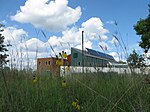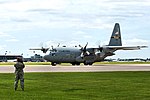Fort Snelling National Cemetery
1939 establishments in MinnesotaCemeteries in MinnesotaCemeteries on the National Register of Historic Places in MinnesotaCommonwealth War Graves Commission cemeteries in the United StatesHistoric American Landscapes Survey in Minnesota ... and 3 more
National Register of Historic Places in Hennepin County, MinnesotaProtected areas of Hennepin County, MinnesotaUnited States national cemeteries

Fort Snelling National Cemetery is a United States National Cemetery located in the Fort Snelling Unorganized Territory adjacent to the historic fort and Minneapolis–Saint Paul International Airport. It is one of the two national cemeteries in the state and is the older. Administered by the United States Department of Veterans Affairs, it covers 436.3 acres (176.6 ha), and as of 2022 had over 248,000 interments. It was listed on the National Register of Historic Places in 2016.
Excerpt from the Wikipedia article Fort Snelling National Cemetery (License: CC BY-SA 3.0, Authors, Images).Fort Snelling National Cemetery
Street 3,
Geographical coordinates (GPS) Address Nearby Places Show on map
Geographical coordinates (GPS)
| Latitude | Longitude |
|---|---|
| N 44.870833333333 ° | E -93.219722222222 ° |
Address
Street 3
Street 3
55450
Minnesota, United States
Open on Google Maps








